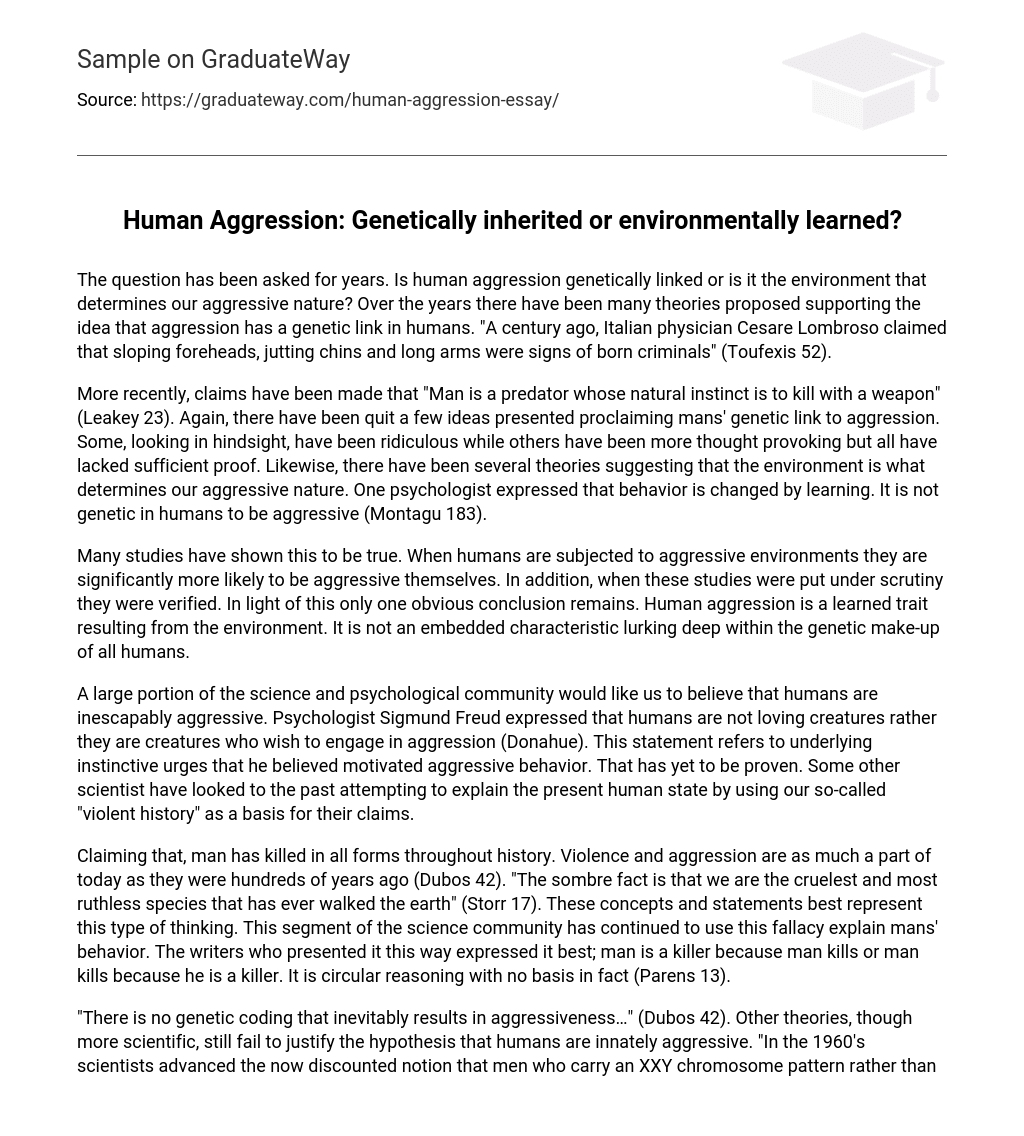The debate regarding the causes of human aggression has been ongoing for a long time, with some focusing on genetic factors and others on environmental factors. Over time, various theories have emerged supporting the idea that genetics play a role in human aggression. Toufexis (52) mentions Cesare Lombroso, an Italian physician from a hundred years ago who claimed that specific physical characteristics – like sloping foreheads, jutting chins, and long arms – indicated inherent criminal tendencies.
Leakey (23) has recently made claims suggesting that mankind’s natural instinct is to use weapons for killing, sparking discussions about the genetic link between humans and aggression. While some ideas have been considered absurd in retrospect, others have prompted further reflection. However, none of these theories have sufficient evidence to support them. Alongside genetic explanations, various theories propose that our behavior is shaped by our surroundings. A psychologist argued that human aggression stems from learned behavior rather than inherent predisposition (Montagu 183).
Research consistently shows that humans become more aggressive when they are in aggressive environments. Additionally, these studies have been validated upon closer analysis, leading to a single conclusion: human aggression is acquired through the environment rather than being an inherent characteristic encoded in our DNA.
Scientists and psychologists are currently debating whether humans have an inherent inclination towards aggression. Psychologist Sigmund Freud argues that humans are driven by aggressive behavior rather than love (Donahue). He believes that this is due to instinctual urges, although there is no concrete evidence for this claim. Furthermore, some scientists study our “violent history” in order to understand present-day human behavior.
According to the text, humanity has engaged in different forms of killing throughout history, and violence and aggression remain widespread today. The assertion that “we are the cruelest and most ruthless species that has ever walked the earth” summarizes this viewpoint. A specific segment within the scientific community continues to employ this misconception when analyzing human behavior. The authors who put forth this notion argue either that man is a killer because he kills or that man kills due to inherent violence. Nevertheless, this argument relies on circular reasoning and lacks factual evidence.
According to Dubos (42), there is no inherent genetic coding that always leads to aggressiveness. Other scientific theories also fail to support the idea that humans are naturally aggressive. As Toufexis (52) explains, in the 1960s, scientists proposed and later dismissed the idea that individuals with an XXY chromosome pattern were more likely to become violent criminals compared to those with the normal XY pattern. It appears that all theories relating to the genetic connection between humans and aggression have been debunked or remain unverified.
The absence of evidence hinders their support for the notion, suggesting that their own beliefs may be influencing them. Ashley Montagu, a psychologist, contends that people often ignore facts and instead choose evidence in line with their existing beliefs when trying to comprehend the origins of human violence (23).
According to Toufexis (52), there is a temptation to excuse violence and avoid accountability for centuries of human aggression. However, it is crucial that we acknowledge our own actions. Therefore, it is important to refrain from using genetics as an excuse for aggression. In line with this, Parens (13) asserts that behavioral genetics becomes a means for a violent and racist society to shift blame onto individuals’ supposed “bad” genes. To foster a more appropriate and coherent viewpoint, Dubos (42) highlights that humans possess the ability both to engage in killing and not to engage in killing.
Scientists and Psychologists have explored the reasons behind man’s aggressive behavior, specifically focusing on the environments we inhabit. Studies analyzing violent crimes across different cultures have provided insights into the influence of the environment on aggression. For instance, one study discovered that the number of killings in America surpasses any other country by a considerable margin, indicating a significant impact of environmental factors on aggressive behavior (Toufexis 52). Furthermore, this study revealed that murder rates within the African-American community are notably higher than those within other ethnic communities in America. Shockingly, murder emerges as the primary cause of death among black individuals aged fifteen to twenty-four (Toufexis 52). It seems absurd to explain these findings with genetic attributions. Is it conceivable that Americans possess a genetic predisposition towards aggression compared to individuals from other countries, except for Native Americans? Likewise, does the higher violent crime rate among African-Americans imply they possess genes that are more prone to aggression? Once again, this reasoning appears unfounded. The true explanation lies within the environment and culture in which a person is raised. The way a person is nurtured and the stimuli they encounter play pivotal roles in shaping their behavior (Storr 19).Africa has a significantly lower violent crime rate than America, despite the fact that native Africans and African-Americans share the same genes. The discrepancy in levels of aggression can be attributed to the impact of the environment and the knowledge we acquire from it. Aggression is a learned trait that is shaped and occasionally fostered by the surroundings we are brought up in. As Montagu (183) asserts, being non-aggressive is simply a result of not displaying aggression.
In conclusion, science has not provided evidence supporting the idea that humans are genetically predisposed to aggression. In fact, various theories proposing inherent human aggression have been invalidated. This suggests that the genetic connection to aggression is, at most, a convenient explanation for our long history of violence. Conversely, multiple studies have examined the impact of the environment on aggressive behavior and consistently demonstrated its influential role. Furthermore, when these studies were subject to scrutiny, the findings remained consistent and the research was substantiated. The undeniable fact is that human aggression is a learned trait shaped by environmental factors, rather than an innate characteristic encoded in our genetic makeup.





